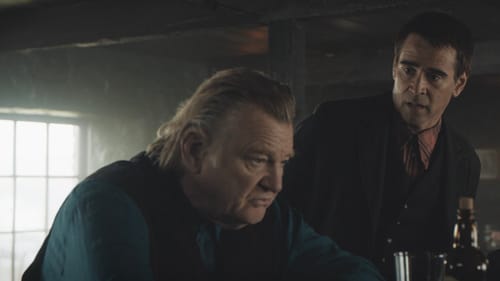Stay in the Loop
BSR publishes on a weekly schedule, with an email newsletter every Wednesday and Thursday morning. There’s no paywall, and subscribing is always free.
PFF celebrates 31 years
The Philadelphia Film Festival presents Decision to Leave, The Banshees of Inisherin, and Armageddon Time

The 31st edition of the Philadelphia Film Festival got underway last Wednesday at three different venues (the Philadelphia Film Center, PFS Bourse, and the newly reopened PFS East). Here is our look at three major films at the festivals, all of which are headed to area theaters soon.
Decision to Leave
The newest film from South Korean master Park Chan-wook does something fascinating: it combines most of the plot elements of the film noir tradition, while grounding itself in the present day with a plot that's all about iPhones, text messages, Apple Watches, voice recordings, translation apps, and other tech of the moment.
But this is no soulless techno-thriller—Chan-wook wields all this to deliver often-devastating emotional punches. Beyond that, Decision to Leave features two amazing performances, and is loaded with beautiful shots.
Part of PFF's Masters of Cinema program, Decision to Leave doesn't look much like the noirs of the past, but it certainly feels like one: Park Hae-il plays Hae-jun, a married homicide detective in Busan, who as the film begins is charged with investigating the death of a man who fell off a mountain.
Suspicion falls on the man's Chinese wife, Seo-rae (Tang Wei), who Hae-jun is soon surveilling, and eventually befriending. They soon fall into a relationship that defies easy classification, but is nevertheless dangerous.
There are other murders, and other mysteries, and a lot of the story is told through audio recordings, Korean-to-Chinese translation apps, and their subsequent analysis (speaking of analysis, there's a great wordplay joke here I'm shocked works in both English and Korean).
That Apple is so prominent can be seen as a knock on South Korea's own Samsung, although Chan-wook has had a relationship with Apple for years.
Decision to Leave, which is South Korea's Academy Award entry for Best Foreign Language Film, has a remaining showing on Monday, October 24, at 8:30pm at PFS East, with a full theatrical release to come on October 28 at Bryn Mawr Film Institute and other area theaters.

The Banshees of Inisherin
PFF went super-Irish on opening night for the second straight year, after kicking off last year with Belfast. This year’s opener, from director Martin McDonagh, is also a period story, but rather than political resonance, it focuses on an under-explored subject in prestige cinema: male friendship.
The Banshees of Inisherin, which was the festival's sole opening-night film, is set in 1923, and reunites Colin Farrell and Brendan Gleeson, the stars of McDonagh's film In Bruges. They live on the titular Irish island, which appears to house only a couple dozen people, and about that many animals.
The plot is kicked off when Colm (Gleeson) suddenly tells his longtime best friend Pádraic (Farrell) that he no longer wishes to be friends. This kicks off something of an existential crisis for Pádraic, who has trouble accepting his former friend's conclusion. Call it "He's Just Not That Into You: Platonic Irish Edition."
Colm eventually takes extreme measures to get his ex-friend off his back. And while the film goes in some extremely dark directions, it's also frequently very funny.
McDonagh, the British-Irish playwright-turned-filmmaker, is making his first film since Three Billboards Outside Ebbing, Missouri, which came out five years ago, and closed the Philadelphia Film Festival that year. While Billboards drew a backlash that it never quite deserved, Banshees has been pretty much universally praised throughout its festival run.
There's a lot to like, starting with the world-building and fine turns from Farrell, Gleeson, Barry Keoghan, and Kerry Condon. But the whole thing left me a little cold.
The opening night performance was one-and-done, but The Banshees of Inisherin heads to local theaters November 4.

Armageddon Time
I wasn't particularly wild about Armageddon Time—that is, until it arrives at an ending that hits like a gut punch.
Directed by James Gray, it's yet another movie this year involving a filmmaker exploring his family's past, and the existence of Steven Spielberg's The Fablemans, which arrives next month, is not likely to do it any favors.
While Gray has often explored the stories of families descended from the former USSR, Armageddon Time is specifically about his experience in a New York Jewish family in 1980. Banks Repeta plays Gray stand-in Paul Graff, while Anne Hathaway and Jeremy Strong are his parents, and Anthony Hopkins and Tovah Feldshuh his grandparents.
One thing may stand out from that cast list: Feldshuh is the only actor who’s Jewish. I’m not usually bothered by this, but this time, I was.
Hathaway is fine, although in one scene where she's cooking, it's notable that the food she's making is just out of the frame. But I never bought Hopkins as a Jewish grandfather. The film even goes so far as to insert a line of dialogue about his mother escaping the Ukrainian shtetl and going to Liverpool, in order to explain Hopkins's accent. As for Strong as the father, he’s not only the wrong ethnicity, but also the wrong age and the wrong physicality; he should be intimidating, but he's not.
The plot of the film has Paul getting into various hijinks with his Black classmate Johnny (Jaylin Webb, who also plays Emmett Till in the new film Till, screened at PFF and now in local theaters). It's clear that their punishments for their transgressions aren't proportional, and ultimately Paul is shunted over to a fancy private school which, in a revelation way too on-the-nose to work, is run by the father and sister of Donald Trump.
While it meanders a great deal getting there, the film leads up to a strong conclusion: that white people—even the sort of self-identified liberals who, in 1980, are viscerally disgusted by Ronald Reagan—will throw their Black brethren under the bus if it means attaining social advancement. Whether the film is specifically making a point about Jews doing that is likely going to serve as a consistent point of contention in the coming weeks and months.
Armageddon Time will show at 6pm on Tuesday, October 25, at the Philadelphia Film Center, and at 8:30pm on Wednesday, October 26 at PFS East. Its Philadelphia release is set for November 4.
What, When, Where
Philadelphia Film Festival. Through Sunday, October 30, 2022, at Philadelphia Film Center, 1412 Chestnut Street, Philadelphia, and other locations. (215) 422-4588 or filmadelphia.org.
Accessibility
The Philadelphia Film Center is a wheelchair-accessible venue. Visit online for more info.
Sign up for our newsletter
All of the week's new articles, all in one place. Sign up for the free weekly BSR newsletters, and don't miss a conversation.

 Stephen Silver
Stephen Silver